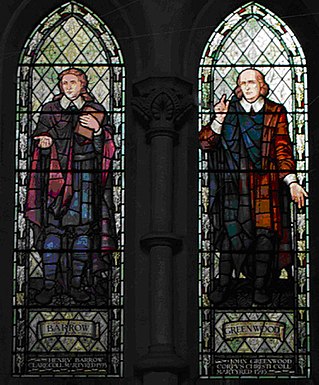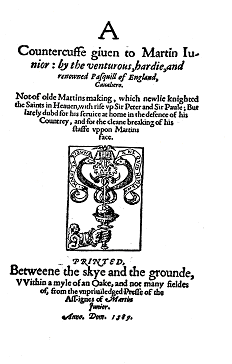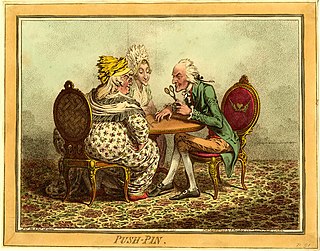
Richard Bancroft was an English churchman, Archbishop of Canterbury from 1604 to 1610 and "chief overseer" of the King James Bible.

John Whitgift was the Archbishop of Canterbury from 1583 to his death. Noted for his hospitality, he was somewhat ostentatious in his habits, sometimes visiting Canterbury and other towns attended by a retinue of 800 horses. Whitgift's theological views were often controversial.

Henry Barrow was an English Separatist Puritan, or Brownist, who was executed for his views. He led the London underground church from 1587 to 1593; spent most of that time in prison; and wrote numerous works of Brownist apologetics, most notably A Brief Discoverie of the False Church.
This article contains information about the literary events and publications of 1608.

Martin Marprelate was the name used by the anonymous author or authors of the seven Marprelate tracts that circulated illegally in England in the years 1588 and 1589. Their principal focus was an attack on the episcopacy of the Anglican Church.
Thomas Cooper was an English bishop, lexicographer, theologian, and writer.

Joseph Ritson was an English antiquary who is well known for editing the first scholarly collection of Robin Hood ballads (1795). After a visit to France in 1791, he became a staunch supporter of the ideals of the French Revolution. He was also an influential vegetarianism activist. He is also known for his collections of English nursery rhymes, such as "Roses Are Red" and "Little Bo-Peep", in Gammer Gurton's Garland or The Nursery Parnassus, published in London by Joseph Johnson.

Samuel Harsnett, born Samuel Halsnoth, was an English writer on religion and Archbishop of York from 1629.

The Marprelate Controversy was a war of pamphlets waged in England and Wales in 1588 and 1589, between a puritan writer who employed the pseudonym Martin Marprelate, and defenders of the Church of England which remained an established church.
John Penry, who was executed for high treason during the reign of Queen Elizabeth I, is Wales' most famous Protestant Separatist martyr.

Thomas Sackville, 1st Earl of Dorset was an English statesman, poet, and dramatist. He was the son of Richard Sackville, a cousin to Anne Boleyn. He was a Member of Parliament and Lord High Treasurer.

John Still was Master of two Cambridge colleges and then, from 1593, Bishop of Bath and Wells. He enjoyed considerable fame as an English preacher and disputant. He was formerly reputed to be the author of an early English comedy drama, Gammer Gurton's Needle.

William John Thoms was a British writer credited with coining the term "folklore" in 1846. Thoms' investigation of folklore and myth led to a later career of debunking longevity myths, and he was a pioneer demographer.

Push-pin was an English child's game played from the 16th until the 19th centuries. It is also known as "put-pin", and it is similar to Scottish games called "Hattie" and "Pop the Bonnet". In philosophy it has been used as an example of a relatively worthless form of amusement.
William Stevenson (1530–1575) was an English clergyman and presumed playwright of the early English language comedy Gammer Gurton's Needle.
Job Throckmorton (Throkmorton) (1545–1601) was a puritan English religious pamphleteer and Member of Parliament during the reign of Queen Elizabeth I. Possibly with John Penry and John Udall, he authored the Martin Marprelate anonymous anti-clerical satires; scholarly consensus now makes him the main author.

Richard Hooker was an English priest in the Church of England and an influential theologian. He was one of the most important English theologians of the sixteenth century. His defence of the role of redeemed reason informed the theology of the seventeenth-century Caroline Divines and later provided many members of the Church of England with a theological method which combined the claims of revelation, reason and tradition.
John Bullingham was the Bishop of Gloucester in the Church of England from 1581.

The reign of Elizabeth I of England, from 1558 to 1603, saw the start of the Puritan movement in England, its clash with the authorities of the Church of England, and its temporarily effective suppression as a political movement in the 1590s by judicial means. This led to the further alienation of Anglicans and Puritans from one another in the 17th century during the reign of King James (1603–1625) and the reign of King Charles I (1625–1649), that eventually brought about the English Civil War (1642–1651), the brief rule of the Puritan Lord Protector of England Oliver Cromwell (1653–1658), the English Commonwealth (1649–1660), and as a result the political, religious, and civil liberty that is celebrated today in all English speaking countries.
John Udall was an English clergyman of Puritan views, closely associated with the publication of the Martin Marprelate tracts, and prosecuted for controversial works of a similar polemical nature. He has been called "one of the most fluent and learned of puritan controversialists".











